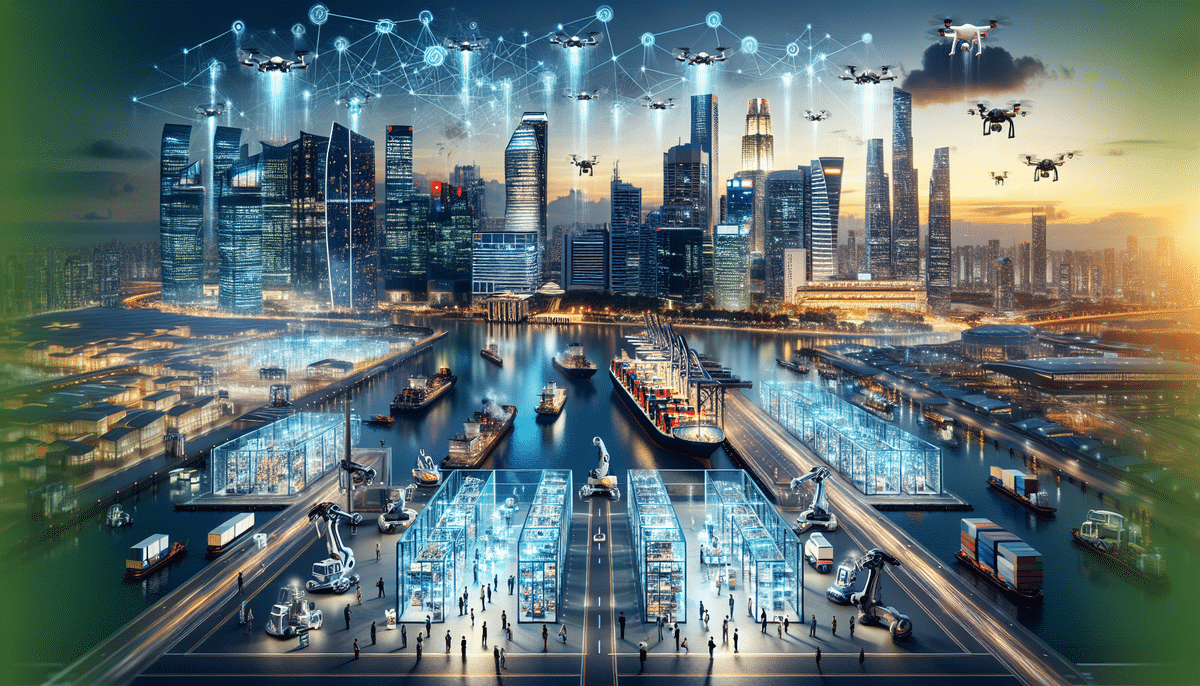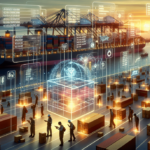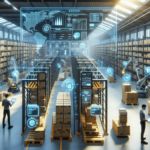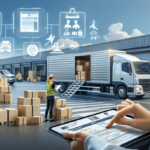Exploring the Emerging Technologies of Futuristic Logistics
Logistics plays an essential role in modern society, with the movement of goods, materials, and commodities serving as the backbone of international trade and commerce. Over the past few decades, it has undergone a significant evolution from traditional transportation methods to modern and innovative solutions. Emerging technologies are driving further advancements in logistics, introducing futuristic solutions that are transforming the industry.
Understanding the Importance of Logistics in the Modern World
In today’s global economy, logistics is more critical than ever. The timely and efficient movement of goods, raw materials, and finished products across the world underpins international trade, supply chains, and economic stability. Without robust logistics, the flow of goods would collapse, leading to disruptions in international trade and adverse economic impacts.
Businesses must continually adapt to meet the ever-changing demands of consumers and the industry by enhancing efficiency and productivity to remain competitive. One of the key challenges faced by logistics today is the increasing complexity of supply chains. As businesses expand globally, they navigate a complex web of regulations, customs procedures, and transportation networks, necessitating high levels of coordination and collaboration among suppliers, manufacturers, distributors, and logistics providers.
Another significant trend in logistics is the growing use of technology to improve efficiency and visibility. From advanced analytics and automation to real-time tracking and monitoring, technology is revolutionizing the management of logistics operations. By leveraging these tools, businesses can optimize their supply chains, reduce costs, and enhance customer satisfaction.
The Evolution of Logistics: From Traditional to Futuristic
Logistics has evolved dramatically from its traditional roots. Historically, logistics involved the movement of goods using horse-drawn carriages, boats, and other conventional transport means. Over time, the industry has embraced road, rail, and air transportation, along with technology to optimize cargo tracking, warehouse management, and transportation routes. The latest advancements in logistics technology include:
- IoT Sensors: For real-time tracking and monitoring of goods.
- Artificial Intelligence (AI): To optimize routes and manage inventory.
- Blockchain: To enhance transparency and security in supply chains.
- Robotics and Autonomous Vehicles: For streamlined supply chains and reduced operational costs.
One of the most significant advancements is the use of drones for last-mile delivery. Drones can deliver packages directly to customers' doorsteps, reducing delivery times and costs. They can also access hard-to-reach areas, such as rural or mountainous regions, where traditional delivery methods may not be feasible. Companies like Amazon and UPS have already begun testing drone delivery services, and this technology is expected to become more widespread in the coming years.
Key Trends Shaping the Future of Logistics Technology
The logistics industry is undergoing rapid transformation powered by technologies such as blockchain, IoT, and smart contracts. These technologies offer immense potential to revolutionize logistics by:
- Enhancing Transparency: Blockchain provides an immutable record of transactions, offering greater visibility into the supply chain.
- Improving Tracking: IoT-powered sensors track the position and condition of cargo, reducing the risk of theft and damage.
- Optimizing Efficiency: Autonomous vehicles can operate continuously without breaks, navigating traffic and difficult terrains efficiently.
By leveraging these technologies, logistics providers can significantly enhance efficiency and customer satisfaction.
Smart Warehouse Management Systems: Enhancing Efficiency and Productivity
Smart warehouse management systems utilize IoT sensors to track and manage inventory in real-time. These systems allow businesses to:
- Monitor Stock Levels: Track the location and availability of stock accurately.
- Reduce Inventory Costs: Identify excess stock and align inventory levels with demand.
- Increase Operational Efficiency: Automate processes to optimize operations swiftly.
One of the key benefits of smart warehouse management systems is improved accuracy and reduced errors. By automating inventory tracking, businesses eliminate the need for manual data entry, minimizing human error and ensuring up-to-date inventory levels.
Additionally, these systems provide valuable insights by analyzing data collected from IoT sensors. Businesses can identify bottlenecks, track employee performance, and predict future demand, allowing for continuous process optimization.
Drones and Robots: Revolutionizing Last-Mile Delivery
Drones and robots are revolutionizing last-mile delivery by:
- Improving Efficiency: Deliver packages faster while reducing congestion and pollution.
- Lowering Costs: Reducing the need for human delivery drivers and operational expenses.
- Enhancing Safety: Delivering to remote areas without risking human drivers and following traffic rules autonomously.
These technologies not only increase efficiency but also provide safer delivery options, benefiting both delivery companies and the general public.
Blockchain and Logistics: Improving Transparency and Security in Supply Chains
Blockchain technology strengthens supply chain transparency and security by providing an immutable record of transactions, including product origin, handling, and delivery. This enhances accountability among logistics providers and eliminates disputes over lost or damaged goods.
Moreover, blockchain reduces the risk of fraud and counterfeiting by ensuring that each transaction is secure and tamper-proof. This is especially crucial in industries like pharmaceuticals, where counterfeit drugs can have severe health consequences. By adopting blockchain, companies can guarantee the authenticity and safety of their products.
Autonomous Vehicles: Transforming Transportation in the Logistics Industry
Autonomous vehicles, including self-driving cars and trucks, are transforming the logistics landscape by:
- Reducing Operating Costs: Eliminating the need for human drivers to lower labor costs.
- Increasing Efficiency: Operating 24/7 without breaks and optimizing routes to avoid traffic congestion.
- Enhancing Safety: Reducing road accidents by minimizing human error.
These vehicles are being tested globally and are set to revolutionize transportation within the logistics industry, offering faster and more reliable delivery services.
Artificial Intelligence in Logistics: Optimizing Operations and Decision-Making
Artificial Intelligence (AI) is increasingly integral to logistics, aiding in:
- Real-Time Decision-Making: Enabling logistics providers to make informed decisions swiftly.
- Predicting Demand: Analyzing market trends to forecast future demand accurately.
- Enhancing Customer Service: Providing responsive and efficient support to customers.
AI-powered systems optimize operations, reduce costs, and improve overall efficiency within logistics operations.
The Role of Big Data Analytics in Predictive Maintenance for Logistics Equipment
Big Data analytics transforms predictive maintenance in logistics by analyzing data from various sources, such as IoT sensors, to identify potential equipment failures before they occur. Benefits include:
- Reducing Downtime: Preventing unexpected equipment failures ensures continuous operations.
- Increasing Reliability: Enhancing the dependability of logistics equipment through proactive maintenance.
- Lowering Maintenance Costs: Minimizing costly repairs by addressing issues early.
Predictive maintenance allows logistics providers to take preventative measures, avoiding costly equipment breakdowns and ensuring smooth operations.
Challenges and Opportunities in Implementing Futuristic Technologies for Logistics Businesses
While futuristic technologies offer numerous benefits, implementing them presents challenges such as:
- High Costs: Initial investments in new technologies can be substantial.
- Regulatory Compliance: Navigating legal requirements related to new technologies.
- Balancing Financial Costs and Benefits: Ensuring that the long-term benefits outweigh the initial expenditures.
Despite these challenges, opportunities abound for businesses that successfully integrate these technologies, leading to enhanced efficiency, reduced costs, and a competitive edge in the market.
Impacts of Emerging Technologies on Employment in the Global Logistics Sector
The adoption of futuristic logistics technologies is reshaping employment in the industry. While certain roles, such as truck drivers and warehouse workers, may decline, new opportunities are emerging in areas like software development and AI specialization. This transformation necessitates that workers:
- Upskill: Acquire new skills to manage and operate advanced technologies.
- Reskill: Transition into roles that support the new technological landscape.
Adaptation and continuous learning will be crucial for workers to remain relevant and thrive in the evolving logistics environment.
The Future of Logistics is Here – Embrace or Be Left Behind
Futuristic logistics technologies hold immense potential for the industry, promising reduced costs and increased efficiency. To remain competitive, logistics providers must embrace these technologies. Innovations such as blockchain, IoT, AI, autonomous vehicles, and drone delivery systems are set to dramatically transform the logistics landscape, offering significant advantages to early adopters.
Case Studies on Successful Implementation of Futuristic Technologies in Logistics
Several logistics providers have successfully implemented futuristic technologies:
- DHL: Tested autonomous delivery vehicles in multiple locations, enhancing delivery efficiency.
- Maersk: Integrated blockchain technology to improve supply chain transparency.
- UPS: Announced plans to launch drone delivery services, aiming to streamline last-mile delivery.
These case studies demonstrate the tangible benefits and potential of adopting futuristic logistics technologies.
A Look into the Future: Predictions for the Next Decade of Logistics Technology
The future of logistics technology is promising, with anticipated advancements including:
- Increased Adoption of AI and Robotics: Further optimizing supply chains and warehouse operations.
- Enhanced Blockchain Integration: Providing greater transparency and security across supply chains.
- Widespread Use of Autonomous Vehicles: Making self-driving trucks and drones commonplace in logistics operations.
- Advancements in 3D Printing: Potentially reducing the need for shipping physical products by enabling on-site manufacturing.
The logistics industry stands at a pivotal moment. Companies that embrace these disruptive technologies will likely lead the way in the coming decade and beyond, driving innovation and setting new standards for efficiency and service excellence.








